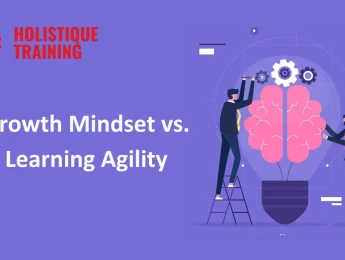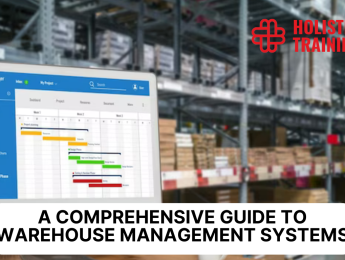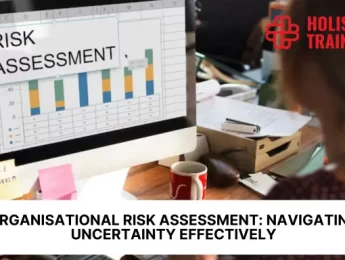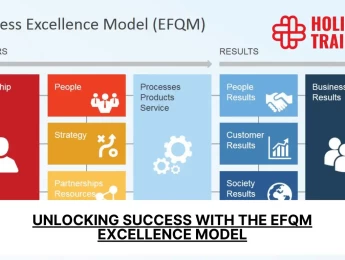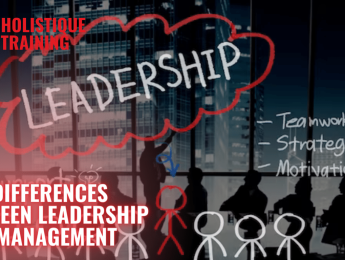Introduction
Project management is the cornerstone of successful endeavours, a symphony of planning, execution, and leadership that transforms ideas into tangible results. Whether you're a seasoned professional looking to refine your skills or a newcomer eager to break into the field, project management courses offer the gateway to excellence in this dynamic discipline. In this comprehensive guide, we will delve into the intricacies of project management, the significance of training, and the certificates that pave the way to a rewarding career. Furthermore, we'll explore the dilemma of choosing between online and in-person courses, and finally, discover how Holistique Training, with its diverse training solutions, can be your compass on this journey.
What Is Project Management?
Project management, in its essence, is the art and science of turning ideas into reality. It is the deliberate and strategic orchestration of resources, people, and time to accomplish a specific goal within predefined constraints. The fundamental components of project management include defining objectives, planning, executing, monitoring, and closing projects. Project managers, the conductors of this symphony, are responsible for coordinating every aspect of the project to ensure its success.
Agile Project Management
One prominent methodology in project management is Agile. Agile project management, unlike traditional methods, emphasises flexibility and adaptability. It acknowledges that projects can change, and it's designed to respond to those changes efficiently. Agile is an iterative approach where work is divided into small, manageable parts, and teams work collaboratively. This methodology is widely adopted in the software development industry but is increasingly finding its place in various other sectors.
Why Is Project Management Training Important?
Project management training is not merely an optional enhancement to your skill set; it is the cornerstone upon which successful projects are built. According to Project.co, approximately 61% of companies offer project management training to their employees in various formats. Here’s why investing in that is indispensable:
Enhanced Efficiency and Effectiveness
Project management training equips you with a systematic approach to handling tasks, resources, and time. By understanding the intricacies of project planning, risk management, and team coordination, you can streamline processes, eliminate bottlenecks, and ensure that every aspect of your project operates with maximum efficiency. This enhanced efficiency translates to a significant reduction in project completion times and resource wastage.
Improved Risk Management
Every project involves risks, whether they are related to budget constraints, scope changes, or unforeseen technical challenges. Project management training provides you with the tools to identify, assess, and mitigate these risks effectively. By being prepared for potential obstacles, you can proactively manage risks, minimising their impact and ensuring that your project stays on track.
Effective Communication and Collaboration
A fundamental aspect of project management is communication – with team members, stakeholders, clients, and suppliers. Project management training hones your communication skills, teaching you how to convey ideas clearly, resolve conflicts diplomatically, and keep all stakeholders informed and engaged. Additionally, it emphasises the importance of collaboration, fostering teamwork and mutual understanding among project participants.
Optimised Resource Utilisation
One of the key challenges in project management is allocating resources judiciously. Training equips you with techniques to identify resource requirements, allocate tasks effectively, and ensure that resources are utilised optimally. Whether it’s human resources, finances, or materials, project management training empowers you to make informed decisions, preventing resource shortages or wastage.
Quality Assurance
Project management is not just about completing tasks; it’s about delivering quality results. Training programmes often cover quality management methodologies, teaching you how to define quality standards, monitor deliverables, and implement corrective measures when necessary. This focus on quality assurance ensures that your projects not only meet but exceed the expectations of stakeholders and clients.
Adaptability to Change
The business landscape is dynamic, and projects often face changes in scope, objectives, or market conditions. Project management training, particularly in Agile methodologies, emphasises adaptability and responsiveness to change. By learning how to embrace change and incorporate it seamlessly into your project plans, you can navigate uncertainties effectively, ensuring that your projects remain resilient and successful even in the face of unexpected challenges.
Career Advancement and Increased Opportunities
Certified project managers are highly sought after in various industries. Holding a recognised certification, such as PMP, not only validates your skills but also opens the door to a plethora of career opportunities. It enhances your credibility as a project management professional, making you a valuable asset to any organisation. With the demand for skilled project managers continuously growing, investing in project management training significantly increases your marketability and career prospects.
In essence, project management training is the key that unlocks your potential as a project manager. It provides you with the knowledge, skills, and confidence to lead projects successfully, delivering results that exceed expectations. By enrolling in a reputable project management training programme, you invest in your future, ensuring that you are well-equipped to tackle the challenges of the ever-evolving professional landscape.
Project Management Certifications
Embarking on a career in project management opens doors to a world of opportunities, but it's essential to lay a strong foundation by earning the right certifications. These credentials not only validate your skills but also enhance your credibility in the competitive job market. Renowned certifications like Project Management Professional (PMP), Certified ScrumMaster (CSM), PMI Agile Certified Practitioner (PMI-ACP), and PRINCE2 are recognised globally and signify a high level of expertise in different project management methodologies. By investing in these certifications, you not only gain in-depth knowledge but also demonstrate your commitment to professional growth, making you a valuable asset in the ever-evolving landscape of project management. That being said, let’s delve deeper into each of these certifications:
1. Project Management Institute (PMI) Certifications
PMI offers a range of certifications catering to various experience levels and methodologies. The Project Management Professional (PMP) certification, one of the most prestigious in the field, is designed for seasoned professionals. It signifies a high level of expertise in project management methodologies and principles. For those at the entry level, the Certified Associate in Project Management (CAPM) certification is an excellent starting point, demonstrating foundational knowledge in project management concepts. PMI also provides specialised certifications such as the PMI Agile Certified Practitioner (PMI-ACP) for Agile practitioners, showcasing proficiency in Agile practices.
2. Scrum Alliance Certifications
Scrum Alliance focuses on Agile project management methodologies, particularly Scrum. The Certified ScrumMaster (CSM) certification validates your understanding of Scrum principles and equips you with the skills to facilitate and lead Scrum teams. Additionally, the Certified Scrum Product Owner (CSPO) certification is tailored for professionals responsible for maximising the value of products and the work of development teams.
3. PRINCE2 Certification
PRINCE2 (PRojects IN Controlled Environments) is a process-driven project management framework. The PRINCE2 certification is highly regarded globally and provides a structured approach to managing projects. It divides the project into manageable stages, making it adaptable to various types and sizes of projects. PRINCE2 certification is particularly popular in Europe and is recognised by many organisations worldwide.
Benefits of Certification:
Earning a project management certification offers a multitude of benefits. It validates your expertise, making you a sought-after professional in the job market. Certified project managers often enjoy higher salaries and faster career progression. Certifications also expand your professional network, connecting you with other certified practitioners and experts in the field. Additionally, being certified enhances your problem-solving skills, decision-making abilities, and leadership qualities, equipping you to handle complex projects with confidence.
In short, project management certificates are not just pieces of paper; they are badges of honour earned through dedication, hard work, and a profound understanding of the discipline. They represent your commitment to excellence and your determination to succeed in the dynamic world of project management. As you embark on your certification journey, consider your career aspirations, preferred methodology, and industry demands. By choosing the right certification and investing in your professional development, you pave the way for a rewarding and fulfilling career as a certified project management professional.
Selecting the Right Certificate for You
Choosing the right project management certificate is a pivotal decision that can shape your career trajectory and open doors to exciting opportunities. It’s not just about obtaining a credential; it’s about aligning your skills, interests, and aspirations with the right certification. Here’s a comprehensive guide to help you navigate this crucial choice and select the certificate that best suits your professional journey:
1. Evaluate Your Career Goals
Consider your long-term career objectives. Are you aiming for a leadership role in project management, or do you prefer a specialised focus, such as Agile or Scrum methodologies? Certifications like PMP (Project Management Professional) are well-rounded, providing extensive knowledge of traditional project management practices and making them suitable for individuals aspiring to manage complex projects across various industries. If you are inclined towards Agile, PMI-ACP (PMI Agile Certified Practitioner) or Certified ScrumMaster (CSM) certifications might be more fitting, emphasising iterative and adaptive project management approaches.
2. Assess Your Experience Level
Your level of experience in project management should also influence your certification choice. Entry-level professionals can benefit from certifications like CAPM (Certified Associate in Project Management), which serves as a stepping stone to the more advanced PMP certification. For mid-career professionals with a few years of project management experience, pursuing PMP certification can significantly enhance their skills and career prospects. Seasoned professionals, especially those in Agile environments, might consider certifications like PMI-ACP or CSM for honing their Agile project management expertise.
Certification | Focus | Industry Recognition |
PMP | Comprehensive knowledge | Global acceptance |
CSM | Scrum framework mastery | Agile-focused organisations |
PRINCE2 | Process-driven approach | Widely used in European sectors |
PMI-ACP | Proficiency in Agile | IT and software development |
CAPM | Fundamental principles | Entry-level project management |
Table 1: Project management certifications comparison
3. Consider Industry Demands
Different industries have varying project management needs. Research the industries you are interested in and identify the certifications that are highly valued within those sectors. For instance, IT and software development industries often prioritise Agile methodologies, making certifications like PMI-ACP and CSM highly relevant. On the other hand, industries with a strong focus on standardised project management processes may prefer professionals with PMP or PRINCE2 certifications.
4. Evaluate the Methodology
Each certification body emphasises different project management methodologies. PMP covers a broad spectrum of project management practices, including traditional, predictive, and Agile approaches. PMI-ACP focuses exclusively on Agile methodologies, while CSM is centred around Scrum principles. PRINCE2, on the other hand, provides a structured, process-driven framework. Consider which methodology aligns best with your interests and the projects you anticipate working on in the future.
5. Explore Training and Preparation Resources
Research the availability of training and preparation resources for your chosen certification. Consider factors such as the availability of classroom training, online courses, study materials, and practice exams. A well-structured and comprehensive training programme can significantly enhance your chances of passing the certification exam. Look for reputable training providers and assess their course content, instructor expertise, and student reviews before making a decision.
6. Budget and Time Constraints
Certifications require both time and financial investments. Evaluate your budget and the time you can dedicate to exam preparation. Consider the costs associated with training courses, study materials, and exam fees. Additionally, assess the time required for studying and exam preparation, especially if you have other commitments such as a full-time job. Choose a certification that aligns with your budget and schedule while ensuring you have ample time to prepare effectively.
In summary, selecting the right project management certification is a significant milestone in your professional journey. Take the time to assess your career goals, experience level, industry demands, preferred methodology, available resources, and constraints. By making an informed decision, you not only enhance your skills but also position yourself as a valuable asset in the competitive landscape of project management. Remember, the right certification is not just a credential; it’s a testament to your expertise and dedication in the field, opening doors to a world of exciting opportunities and professional growth.
Project Management Courses: Online or In-Person?
As you embark on your project management training journey, one of the critical decisions you'll face is choosing between online and in-person courses. Both options offer distinct advantages, and the choice you make should align with your learning style, preferences, and individual circumstances. Let's explore the unique benefits of each format to help you make an informed decision:
1. Online Courses
Online project management courses have gained immense popularity due to their flexibility and convenience. Here are the key advantages of opting for online learning:
Self-Paced Learning
Online courses allow you to learn at your own pace. This flexibility is invaluable, especially if you have a busy schedule or other commitments. You can study at times that are most convenient for you, enabling a harmonious balance between work, personal life, and education.
Global Accessibility
Online courses break down geographical barriers. You can access high-quality training programmes from anywhere in the world, connecting with expert instructors and diverse peers. This global perspective enriches your learning experience, exposing you to different project management practices and cultural insights.
Interactive Multimedia
Modern online courses utilise interactive multimedia elements, such as videos, simulations, quizzes, and discussion forums. These engaging resources enhance your understanding of complex concepts, making learning enjoyable and effective.
Cost-Effectiveness
Online courses often come at a lower price point compared to in-person training. Additionally, you save on commuting and accommodation expenses, making online learning a cost-effective option.
2. In-Person Courses
In-person project management courses offer a traditional, classroom-based learning experience. While they may require more commitment in terms of time and location, they offer unique advantages:
Structured Learning Environment
In-person courses provide a structured and focused learning environment. The physical presence of instructors and peers fosters direct interaction, enabling immediate clarification of doubts and in-depth discussions on complex topics.
Real-Time Feedback
In a classroom setting, instructors can provide real-time feedback on your progress. This immediate feedback loop is invaluable for understanding challenging concepts and refining your skills promptly.
Networking Opportunities
In-person courses facilitate face-to-face networking with fellow professionals. Building relationships with peers and instructors can lead to valuable connections, mentorship opportunities, and collaborative projects in the future.
Accountability and Discipline
Attending in-person classes instils a sense of accountability and discipline. Having a fixed schedule and physical presence in the classroom can enhance your focus and motivation, ensuring consistent progress in your studies.
3. Making the Choice
The choice between online and in-person courses ultimately depends on your learning preferences and lifestyle. Consider the following factors when making your decision:
Learning Style
Do you thrive in a self-paced environment, or do you benefit from structured, classroom-based learning? Assess your learning style honestly to determine which format suits you best.
Schedule and Commitments
Evaluate your daily schedule and existing commitments. If you have a hectic routine or significant time constraints, online courses might offer the flexibility you need. On the other hand, if you can dedicate specific days or weekends to learning, in-person courses could be a viable option.
Interactivity Preference
Consider how much interaction and feedback you require. If you value real-time discussions, immediate feedback, and networking opportunities, in-person courses might be the ideal choice. If you prefer self-guided learning with occasional online interactions, online courses could be more suitable.
Budget
Evaluate your budget for training. In-person courses may have higher fees due to the additional costs associated with physical facilities. Compare the costs of both options, factoring in any travel or accommodation expenses for in-person training.
In short, both online and in-person project management courses offer valuable learning experiences. Your decision should be based on your unique preferences, learning style, and circumstances. Regardless of the format you choose, what matters most is your commitment to learning and your active participation in the course. By making a well-informed choice, you can embark on your project management training journey with confidence, ensuring a rewarding and enriching educational experience.
How Holistique Training Can Help You in Your Journey
In the vast landscape of project management courses and certificates, Holistique Training stands out as a beacon of quality and versatility. We offer a range of project management courses that cater to different skill levels and interests. Whether you are a novice seeking a foundational understanding or an experienced professional aiming to specialise, our offerings cover your needs.
Our courses come in three different formats: online, classroom, and in-house. This diversity ensures that you can choose the learning environment that suits you best. If you prefer the flexibility of online learning, you can access our courses from anywhere in the world. Alternatively, if you thrive in a classroom setting with face-to-face interactions, our in-person courses offer a traditional approach to learning. For organisations looking to train their teams, our in-house training solutions bring the classroom to your doorstep.
Many of our project management courses are PMI-registered, ensuring that you receive industry-recognised training. We cover a wide array of project management methodologies, including Agile, PRINCE2, and traditional project management principles. Our experienced instructors are industry experts who provide practical insights and real-world examples to enhance your learning. So, what are you waiting for? Contact us now for more information, and let’s embark on this journey together!
Conclusion
Project management is a discipline that opens doors to a multitude of opportunities. It's a skill set that can propel your career and make your projects more successful. To embark on this journey, project management courses and certifications are the stepping stones. Choose the right one for you, considering your career aspirations and industry needs. And in this endeavour, Holistique Training can be your guiding light, offering diverse training solutions that suit your preferences and career objectives. So, embrace the world of project management, equip yourself with the right knowledge, and let Holistique Training be your trusted partner on this exciting voyage.
In your journey toward a rewarding project management career, consider our PMI-registered course, ‘Project Management for Non-Managerial Positions.’ Tailored for beginners, this course provides a comprehensive foundation in project management essentials, empowering you with the skills needed to excel in non-managerial roles. With a curriculum crafted by industry experts, hands-on projects, and personalised guidance, this course not only opens doors but also ensures you step confidently into the world of project management. Start your professional journey on the right foot – enrol now and unlock the gateway to a successful career in project management!








